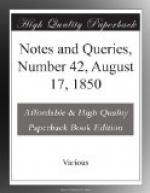Be that as it may, the above is one of a series of deductions by which I am prepared to prove, that as the land geography of Germany by Alfred is restricted to the valleys of the Weichsel (Wisle), the Oder, the Elbe, and the Weser, so the sea voyages are confined to the debouchures of such of these rivers as flow into the Baltic. This would give a combined action of purpose to both well suited to the genius of the monarch and the necessities of an infant trade, requiring to be made acquainted with coasts and countries accessible to their rude navigation and limited commercial enterprise. So prudent a monarch would never have thought of noting down, for the instruction and guidance of his subjects and posterity, the account of a voyage which even now, after an interval of ten centuries of continued nautical improvements, and since the discovery of the compass, is not unattended with danger, nor accomplished in less than a year’s time wasted.
WILLIAM BELL, Phil. Dr.
British Archeological Association.
* * * * *
REMARKABLE PROPOSITION CONCERNING IRELAND.
The following passage, which contains a curious proposition relating to Ireland, will probably be new and interesting to many readers of “NOTES AND QUERIES,” since the book from which I extract it is a scarce one, and not often read. Among the many various schemes that have of late been propounded for the improvement of our sister country, this is perhaps not the least remarkable, and shows that the questio vexata, “What is to be done with Ireland?” is one of two centuries’ standing. James Harrington, in his Oceana, the Introduction, {180} (pp. 35, 36., Toland’s Edition, 1700), speaking of Ireland under the name of Panopea, says,—




